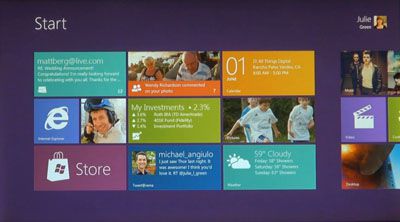- Qualcomm Launches Snapdragon 4 Gen 2 Mobile Platform
- AMD Launches Ryzen PRO 7000 Series Mobile & Desktop Platform
- Intel Launches Sleek Single-Slot Arc Pro A60 Workstation Graphics Card
- NVIDIA Announces Latest Ada Lovelace Additions: GeForce RTX 4060 Ti & RTX 4060
- Maxon Redshift With AMD Radeon GPU Rendering Support Now Available
Windows 8 Could Require Internet Access for Continued Use
It’s no secret that one of the most pirated pieces of software is the entire Windows OS, and if not for the fact that a Windows license is forced on consumers more often than not with the purchase of a desktop or notebook PC, the number of non-legal users could be at unfathomable levels. Piracy is an issue Microsoft has obviously sunk a lot of R&D and money into, but to this day, the company has never seen the success it’s wanted – or needed.
With recent Windows releases, things have only gotten worse, with zero day cracks being released to the Web thanks to knowledge gained through a lengthy beta period. When Microsoft tries to counter a crack, it inevitably gets worked around, making it seemingly impossible for the company to truly protect its OS.
But is it impossible? Microsoft has a keen interest in the “cloud” – that is, storing data online rather than locally – and as such, Windows itself looks to be the perfect target of data streaming. Imagine most of your OS being installed locally, but some key files needing to be streamed or downloaded each time you boot up. It might sound complex, but it wouldn’t be difficult to pull off.

If Microsoft did something like this, it means that piracy for Windows could simply disappear. Because explicitly-required OS files couldn’t be patched, as they are grabbed remotely, Windows 8 could well be the first Windows OS in quite a while where a crack isn’t available shortly after its launch, or at all.
In order for a crack to prove successful with an implementation like this, it’d have to first disable the mechanic that grabs OS files on boot, and then manage to retain cracked read-only versions of said files on your machine, tricking Windows into thinking it verified your install when it actually didn’t.
Further, Microsoft recently patented a “fast boot” feature where files can be snagged before you even hit the desktop. This would make cracking the OS even more difficult. It’d also require you to always be connected to the Internet in order to verify your install, something no one in their right mind would approve.
On the other hand, such implementations could reduce or rid piracy, potentially lowering the price of Windows licenses, and it’d also rid the chance of Windows accusing you of being a victim of counterfeiting even when you’re not (one of the worst things to be introduced with Vista).
It’s too early to speculate what implementation will ship with Windows 8, but if it’s anything that’s going to require online access, it’s surely not going to go over well with consumers.




